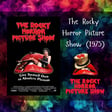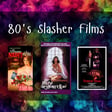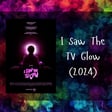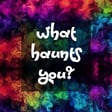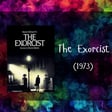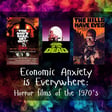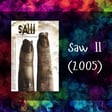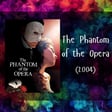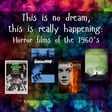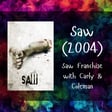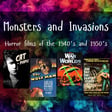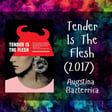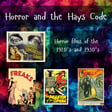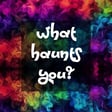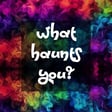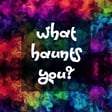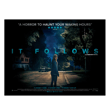Become a Creator today!Start creating today - Share your story with the world!
Start for free
00:00:00
00:00:01

Men, Women, and Chain saws--Intro: Carrie and the Boys
In this episode Carly and Katie discuss the introductory chapter of Men, Women, and Chain Saws: Gender in the Modern Horror Film, by Carol J. Clover, published in 1992. The book is a “cultural critique and investigation of gender in slasher films and the appeal of horror cinema, in particular the slasher, occult, and rape-revenge genres, from a feminist perspective.”
Music used under Creative Commons License
By:https://freesound.org/people/ADnova/
Come find us on instagram: instagram.com/whathauntsyoupod
Transcript
Introduction to 'What Haunts You'
00:00:00
Speaker
you
00:00:07
Speaker
Welcome to What Haunts You, a podcast about the stories that haunt our dreams. And in this case, a podcast about the stories about the stories that haunt our dreams. I'm Katie. And I'm Carly. You can find us on Instagram at What Haunts You Pod or tap the bell to get notified when we have a new episode out. And if you're really having a good time, you can leave us a five star review on Spotify. We would love that.
00:00:31
Speaker
Yes, please. We are actually talking about a book today. I read a lot, like an absurd amount sometimes. And so we thought it would be fun for me to tell Katie about the books that I'm reading when they are horror related and just kind of talk about what comes up in them.
00:00:49
Speaker
Yes, yes. I'm very curious about this
Exploring Gender in Horror Films
00:00:52
Speaker
book. Yeah. So this book was called Men, Women and Chainsaws. And it's by Carol J. Clover. And it is about gender in the modern horror film. Nice.
00:01:04
Speaker
Yeah, just like the title of the book in general, it's endearing. It is, it is endearing. So what do you like think of when you think of just the idea of this book and the title? Like what's in your head just off off judging a book by its cover?
00:01:20
Speaker
I mean, chainsaws obviously makes me think Texas Chainsaw Massacre, and I feel like there is kind of a lot of gender stuff in that one as well. And we already talked about this a little bit and like the the like final girl thing and the way that the audience members are mostly young men, but they're kind of
00:01:41
Speaker
learning how to sympathize with women some of the time, or maybe it's another way to objectify them. But the author is definitely looking at it as not objectifying them. I'm not sure how to. That actually, so one of the quotes that I have written down kind of jumps off of that. And she says, I believe that the standard critique of horror as straightforward sadistic misogyny itself needs not only a critical but a political interrogation.
00:02:08
Speaker
So she's essentially saying that the idea that it's all kind of identifying with victim and like all about kind of objectifying women and harming them is like a faulty view on horror. And a lot of that throughout the book, she kind of attributes that to taking an approach from outside of it of somebody who's not really interested in it and maybe doesn't actually understand that well how it functions. And I think that's like interesting to think about too.
00:02:34
Speaker
Right. I think it's hard to like accurately critique something that you don't really engage with. Like if you don't like horror because you don't like being scared, then you aren't really going to understand the other layers and dimensions of it. Right.
00:02:50
Speaker
And she says that the book is not actually about horror, even though it kind of is about horror, but she's basically talking about the relationship that the majority viewer or like younger men or teenage boys sometimes, the relationship of them to the female victim heroes of horror movies, which is usually the final girl, but like sometimes plays out differently in different sub genres.
00:03:11
Speaker
but she's mostly focused on a couple specific subgenres that really relate to the idea of gender and really kind of discuss it. So what we're going to do is kind of take this one at a time. So we'll do a couple of different episodes about this book.
Victim Heroes and Final Girls
00:03:24
Speaker
And today we're just talking about the introduction because there's like a lot of good stuff here. And I don't want to rush through it because it's going to be fun to talk about, I think.
00:03:31
Speaker
Yeah. And there's some movies that we might talk about along with some of the later chapters, right? Yeah, I think so. Just some good kind of examples. They'll probably be ones that are in the book, because those will be, you know, kind of stand out examples of the things that she's talking about. So I think it'll be interesting to have that for a frame of reference. Yeah, I like the idea of the victim hero, because I think that people do like a lot of
00:03:56
Speaker
infantilizing and weird like sympathizing in a way that like isn't actually that sympathetic with victims and I think like just kind of the journey that a lot of the final girls come to of like realizing that they want to stay alive and like how much power and strength is inside them to manage that and like going through horrible things but then they're also like
00:04:19
Speaker
going through horrible things and like obviously going to be dramatized and are victims in that way. And in the chapter about slashers it really gets into like the archetype of the final girl and her kind of transition from victim into hero and like how that arc plays out.
00:04:35
Speaker
in the slasher section she goes into talking about the process of like where they're victimized. Like how they go from victim to hero basically. Yeah I like that. I mean I've
Familiarity and Comfort in Horror
00:04:47
Speaker
definitely felt like the horror was mostly just victimizing women when I wasn't watching it as much but I feel like there are a lot of
00:04:54
Speaker
really strong powerful women in horror and now that I've watched a lot of it and I think it's cool to watch I kind of think there's like a good bad dichotomies stereotype with men and women in general where it's like oh women could never do anything bad like in the I don't know which is kind of infantilizing itself
00:05:14
Speaker
Oh, yeah. And and so I kind of like it when women are villains or just like misdirected and like doing like I'm thinking of Amanda and Saw. That's her name, right? Oh, yeah. Great character. I know. I agree. But kind of off of what you said about there being a lot of strong female characters in horror, I actually kind of think horror was making strong female leads before kind of any other genre was doing that regularly. For sure. You know, and I think that that's
00:05:43
Speaker
actually think that's pretty cool. She also talks a little bit, and this is before she starts really getting into the gender he leads, about how horror is kind of reminiscent of folklore in the way that it functions. And she basically talks about
00:05:58
Speaker
how, especially with the way that there is kind of a template for horror that we want to see. And so on some level, right, like when we go see a slasher movie, there's a formula that we're asking to take part in. And it's kind of got the art, you know, it's got the archetypal characters, it's got these kind of villains hiding in places, right, and kind
Gender Roles and Dynamics in Horror
00:06:19
Speaker
of stumbling into a situation and then having to resolve it. And she says that
00:06:23
Speaker
One can recognize in horror the hallmarks of oral narrative, free exchange of themes and motifs, the archetypal characters, situations, accumulation of sequels, remakes, and imitations. This is a field in which there is, in some sense, no original, no right or real text, but only variant.
00:06:40
Speaker
A world in which the meaning of the individual example lies outside of itself. The art of the horror film, like the art of pornography, is to a very large extent the art of rendition or performance, and it is understood as such by a competent audience. A particular example may have original features, but its quality as a horror film lies in the way it delivers the cliche. Mmm, how it delivers the cliche. I like that. I think that's like what good pop music is, too. Yeah, totally.
00:07:09
Speaker
But yeah, I mean, I've definitely noticed that with horror, that it is very formulaic, but good horror still makes it interesting and exciting. I know also for a long time, I wanted the formula where it's like, something's bad, and then the good guys take it over, and then at the end, everything is resolved. But now it's become more and more common, I think, because that was such a cliche. Now almost like the new cliche is like, duh, duh, duh, it's still lurking in the background.
00:07:40
Speaker
Yes, I totally agree. Because I think that used to be exciting. And now it's like not even now that's like we come old hat as well. I think that scream is a really the scream franchise actually is a really good example of this. Right? Like we want the same thing to happen. But we want to happen. We want it to happen in a way that feels novel and fun and a little bit different. Right. And follows the pattern enough that you can put that pattern feature into it, but doesn't follow it enough that you're totally, totally convinced of what's happening.
00:08:07
Speaker
When you were younger or I mean I guess even still but like did you ever go through a time when you would like watch the same movie and over and over again like sometimes multiple times in a day? Do you want to know what movie I remember doing that with? This is funny. Yeah. Is the people under the stairs when I was like 15. I like remember renting that on like on demand when that was like through your TV you know? Yeah. And you get it for like whatever like the two days and I would I just remember watching it like four times.
00:08:37
Speaker
I remember doing that with the movie must love dogs. I don't know what that one is. I don't think it's Janine Garofalo. I think she's like a vet or some I don't know. It's not important. But but it was just making me think of that. Like, I think a lot of people like to rewatch.
00:08:54
Speaker
movies and it's comforting and I think especially with horror it is like it takes some of the potential fear away like even if you want the jump scares or whatever like kind of fear that you want it adds like a layer of protection that it's almost the same thing all of the time yeah and it's something it's something that's like still exciting and fun but is is
00:09:19
Speaker
like fits within your expectations and like having expectations is comforting. Yeah and I also think that it's made me think about film a lot more because like I start looking at other aspects of the movie since I don't have to pay as much attention to like what's happening some of the time like it makes me look at like how they're shooting it like what like the colors and the angles and that kind of stuff which is fun to
00:09:47
Speaker
And now I've taken that into other things that I watch as well, not just horror, but I started doing that because of horror. Yeah, I feel like there are some movies where it's really fun to watch it several times and kind of in your head alter who the protagonist is and who you're going to invest the most in emotionally. And that's kind of fun to see how that impacts how you're watching it and how you're feeling.
00:10:11
Speaker
I always love any movie that has like little hidden things that you don't notice until you've watched it several times. Talking about this is making me want to watch Burberry. I was thinking of like Midsommar. Yeah, yeah, yeah.
00:10:25
Speaker
So when she starts getting into gender, one of the first things that she really does talk about, I think you kind of mentioned this a little bit, is who is being identified with and how, you know, the kind of audience stand in character is almost always a woman or a girl. And she kind of talks about why that is. And she actually has a moment where she's comparing that to action movies, which I thought was kind of interesting because they follow kind of a similar
00:10:52
Speaker
formula where usually there's something bad. Think about John Wick. There's a different ratio of how long each thing takes, but the same kinds of thing happens where you have some bad thing that happens to someone, they're upset, and then they go take revenge. There's a different amount of time spent on each of those factors, but it's the same kind of steps.
00:11:14
Speaker
And she talks about how horror has more of an emphasis on the victim part of the story and like the being victimized part of
Metaphors and Gender Fluidity
00:11:21
Speaker
the story. And also that the nature of the suffering is she talks about it being essentially based in castration anxiety for men and
00:11:31
Speaker
that is kind of a more complicated thing to look at than the kind of suffering that's in action movies. I guess she basically says like it says like so messy and unwholesome. In fact, that running it through a woman may be the only way that it can be run. I also feel I also feel like action movies like they don't
00:11:48
Speaker
show gore, really. You'll see 20 people get blown up, but they don't zoom in on the people dying, really. And I think that that's an interesting thing. I mean, I think we've talked in several episodes about several movies about just fundamental fear of death. And I think that horror movies are always
00:12:11
Speaker
look it's death look at it but also like i i find action movies boring a lot of the time and i think i that's part of what makes horror movies intriguing to me even if they aren't that different but they like zoom in on it and i think it's also like the way
00:12:27
Speaker
that the victim can change because even if somebody is like horrible and the antagonist the whole time when they if if they get killed or we see them dying they have like this moment of victim vulnerability even if they've been the bad guy the whole time yeah yeah that actually makes a lot of sense and i i agree that they're not they don't keep me as interested in action movies once in a while they'll be a good one but on the whole they're kind of eh
00:12:56
Speaker
And even when I'm watching some things, if the action sequences take too long, I start getting a little bored. Like I'm watching Walking Dead, and when there are big shootouts between like groups of people, I'm kind of like, eh. Right.
00:13:08
Speaker
I can do with like 30 seconds of that. And then it starts being like, like, I love Lord of the Rings, but some of the big fight scenes and that I'm like, you're just doing the same thing over and over. Can you stop? But I can see how it makes more sense in like a book where you're like, here's what's happening to this guy over here. And then to happen to that guy. Yeah, horror movies are more creative.
00:13:32
Speaker
Yeah, I think so. And I think like having so many cliches within a genre does sometimes force you to be extra creative. And I think even like when you think of a slasher movie, I think the fun of slashers is what new and interesting ways are they going to come up with to kill people?
00:13:48
Speaker
I also love horror comedies or horror parodies where they're making fun of all of the cliches, but then still have scary parts. I think that that brings a lot of interesting stuff to light.
00:14:02
Speaker
You know what movie I've totally been thinking of as I was going through my notes for this book is behind the mask the rise of Leslie Vernon, where he's like talking about all of the like phallic symbols and like womb symbols and all this stuff. Oh, yeah, yeah, yeah. I was thinking about that a lot when I was going through
00:14:20
Speaker
because he just talks about it so openly in that movie, which that movie is not really a comedy, but it kind of does that same thing of just kind of making fun of the process. Yeah. She talks about like the difference between the one sex model and the two sex model way of like understanding sex.
00:14:38
Speaker
And it's basically the idea that the two sex model can choose male and female as totally different from each other, like essentially and fundamentally different. Yeah. And the one sex model is basically that like they're like analogous and basically like the parts are the same, but just in different places. And like this is obviously with the premise that women are like imperfect men, right? Like men whose parts are messed up basically or like an inferior version of the same parts. Yeah.
00:15:05
Speaker
And she talks about how the one sex model got kind of overtaken by the two sex model around the late 18th century. But in stories, we have still a very one sex way of kind of presenting things. I know that this comes from religion, but the idea that the man is the first human makes no fucking sense.
00:15:28
Speaker
What came first, the chicken or the egg? Right. But even within the chicken or the egg thing, it's like it had to be a uterus to bring like what? It is an interesting, it is an interesting, not based on science perspective, for sure.
Universal Themes in Horror
00:15:47
Speaker
I think there is a lot of de-gendering in like, I mean, there's definitely like gender based violence stuff in torture, like related to like, I'm thinking of, um, my god, I can't think I think of his name, the clown. Pennywise? No, no.
00:16:02
Speaker
Oh, Terrifier, Art the Clown? Yeah, yeah. In Terrifier, where he cuts her boobs off and splits her in half, that felt very gender-related. And there's definitely a lot of gender-based violence stuff. But a lot of times, there feels like a separation from gender with certain killers. I guess, I don't know, it depends on the
00:16:24
Speaker
Now I'm thinking of like psych profiles of killers and stuff like they have like preferred victims and things like that. But a lot of times I feel like there is like this de-gendering when they're just like, like in Scream, they're just like killing for the fuck of it. And it doesn't, people, they don't really seem very focused on gender or
00:16:45
Speaker
saw as well like unless unless the thing that he's trying to get them to stop doing or whatever their whatever their thing that made him choose them is related to their gender generally it's not and it seems like i don't know i don't feel a lot of gender in that movie i think that they do interesting stuff with gender because it feels like it's not that important jigsaw is an equal opportunity murderer
00:17:13
Speaker
I guess not murderer, but trap setter. Yeah. I think I'd still call him a murderer. He wouldn't like that.
00:17:24
Speaker
Yeah, I'm okay with that. I know. But I do love saying would you like to play a game or I would like to play a game. I do too. It's great. It's great. And you're gonna be so excited when we get into the slasher one because that is where like the gender fuckery of horror is I think the most fun. It's like serious in other chapters in a way but in the slasher one it's a little bit more fun on some level.
00:17:48
Speaker
Yeah. But yeah, so she's talking about the one sex and two sex model. And one of her like arguments is essentially that horror is one of the like main places where one sex logic comes in. And she says like science fiction is probably in second place for that. There's a lot of science fiction crossover in horror. I was thinking that too. Yeah, I was even thinking about like alien. There's like a lot of birth, obviously related stuff in alien. But she says,
00:18:15
Speaker
The world of horror is one that knows very well that men and women are profoundly different, but one at the same time repeatedly contemplates mutations and sliding whereby women begin to look a lot like men, men are pressured to become like women, and some people are impossible to tell apart.
00:18:30
Speaker
I don't think I even understand what that means. I'm trying to explain it without getting too far down the slasher part rabbit hole. It's basically about the shifting of gendered positions in horror and like the feminization of male villains and the masculinization of the final girl.
00:18:47
Speaker
And then obviously like some of the kind of gender ambiguous situations that come up in horror around problematic themes of stuff like cross-dressing, trans villains, villains raised against their will as the opposite gender, all of these things. And so I think that it's kind of just talking about horror presents men and women is pretty different from each other, but through the process of whatever is happening in the horror, those lines become really blurry.
00:19:14
Speaker
And I think also there's like I can think of I can't think of any specifics but I can think of a lot of movies and I think horror movies where the man is it's like a couple or like a group of men and women and the man is like just not doing a very good job at whatever and so the woman ends up doing something that's like more traditionally male gender role just because they're like the only one who has their shit together.
00:19:40
Speaker
We were talking about a non-binary horror movie, or I don't know if it was a villain or just a character, but I think you said it was just called Them. It's called They Them, I think. But yeah, I still haven't watched it. We should watch it, though. Yeah, I'm curious about
Horror's Crossover with Sci-Fi
00:19:57
Speaker
that.
00:19:57
Speaker
Yeah, I'm definitely curious about it, too, because that is a theme in many horror movies, but like not done the most delicately. And I'm curious if that's like shifted at all with time. Right. Well, and I think that's one thing about this book, too. This book is from the 90s and it's focused on 70s, like 60s, 70s and like, I think maybe a little 80s horror. So it's a little dated in the way it thinks about gender. But I also think like horror is like simultaneously dated and ahead of its time on gender, I think perpetually on some level. Yeah.
00:20:26
Speaker
at least to me. That makes sense. But yeah, so then she starts getting further into like the gender role part of the book and the gender role stuff relating to horror. First of all, monster and hero. So like villain and hero. Historically, like in most things are represented by males, and the function of victim is more often represented by females.
00:20:48
Speaker
to the point that when there is a female hero or villain outside of horror, we like kind of even notice it. But then within horror, whenever there is a villain or a hero that is a woman, a female villain or female hero, they're often more masculine in their clothes, their behavior. Sometimes they even have like a nickname that kind of crosses, like comes across as masculine.
00:21:10
Speaker
And they seem to be gendered kind of differently than their female friends, right? Because a lot of the time in a horror movie, there's like a group of like friends. Yeah. And so and so she makes the argument that like within the context of horror, that sex proceeds from gender and not the other way around. She says a figure does not cry and cower because she is a woman. She is a woman because she cowers and cries. And a figure is not a psycho killer because he is a man. He is a man because he is a psycho killer. So
00:21:38
Speaker
she's kind of talking about the ways that gender gets pushed onto the characters in these really overly symbolic ways.
Future Topics in Horror Subgenres
00:21:48
Speaker
And the reliance on that that a lot of the movies have. Right, with Michael Myers, they're like, he's obsessed with his sister, he's obsessed with, what's her name? Because he was obsessed with his sister, there seems to be a... He's a man, so he's obsessed with this woman in this pseudo-romantic way.
00:22:06
Speaker
Right and like the killing of men in slasher movies is almost always kind of incidental You know what I mean? Like it isn't it isn't like a main kind of item happening And then she kind of said she says there are really only two characters in a myth mobile heroic being who crosses boundaries and penetrates closed spaces and an immobile being who personifies that damp dark space that constitutes that which is to be overcome and
00:22:31
Speaker
That's interesting. So basically what she's talking about here, I think, is that the positions available within the movie are so highly gendered that it almost wouldn't matter who was in them. There seems like there's a lot of highly performative gender stuff to almost draggy. Oh my god, yeah.
00:22:57
Speaker
like like overtly like high femme yeah can i actually read a quote this is in the slasher chapter but it's just so related to what you said that i need to say it anyway she says uh the idea that appearance and behavior do not necessarily indicate sex and indeed can misindicate sex is predicated on the understanding that sex is one thing and gender another
00:23:17
Speaker
in practice that sex is life, a less than interesting given, but that gender is theater, whatever else it may be stretches waving of the chainsaw is a moment of high drag. Yes. Yes. Which is like talking about and Texas chainsaw too. Have you seen Texas chainsaw too? No, it's really fun. You should see it. But there's there is a moment where she's like holding the chainsaw like crotch level and she's just like being given a dick, right? Like she she has like the phallic tool now.
00:23:47
Speaker
Yeah. Well, and I think we talked about Leatherface has like his like mommy woman face that has like lipstick on in the first one.
00:23:57
Speaker
I'm excited to hear more. I think that you and I talk about gender a lot and talk about horror, but we haven't talked about gender within horror that much in any of our episodes. So I think it'll be an interesting thing to get into more. And I don't know how I've never related drag to horror before, because that feels really obvious. Yeah.
00:24:18
Speaker
So I'm really glad that you're sharing this with me because I don't think I will read this book, but I'm really interested in what's in it. So it's nice to get the high level summer. It's definitely really interesting. And I feel like it takes it just the right amount of seriously. You know what I mean?
00:24:36
Speaker
Yeah, because like it is weird. So that pretty much kind of covers the intro of the book. And then she's going to have four chapters and she focuses on three different sub genres of horror that are the most related to gender slasher films, occult films and rape revenge films. So for slasher, I don't think either of us are going to have to watch any new ones. I may watch one to like get in the spirit, I guess, but
00:25:03
Speaker
We'll probably just talk about classics on that one. For occult movies, The Exorcist is a really good one. And then I think Possession is a really good one, the one that I watched the other day that I was telling you about.
00:25:16
Speaker
Oh yeah, I haven't seen that one. I've seen The Exorcist a bunch, and I would always watch it again. Well, I know you've seen that one too, so I feel like that'll give us two. And I think that'll be good because that's the adult story versus child story too, which I think gives us a wide array of how that can play out.
00:25:34
Speaker
And then for rape revenge films, I think we should do I Spit on Your Grave. That's always going to be, I think, the quintessential one. Okay, I've never seen that. I'm I would like to see it. I also, does she talk about teeth at all? I want to talk about teeth. Yeah, so she doesn't she doesn't talk about it because she's only talking about like older movies than that, basically.
00:25:56
Speaker
Oh, right, right, right. It was I would say that that is definitely right. Prevention date adjacent though, for sure. I think usually there are more down to earth than that one is vagina don't I know that one to me is kind of like in a category in my mind with like Jennifer's body and ginger snaps.
00:26:13
Speaker
Cause it's kind of like a, I don't know. It's like, it's got the same vibe. Coming of age, sci-fi-ish. Yeah, like the coming of age, like kind of like weird sexual life of teenage girlhood, but not just straight up murder. I mean, it is murder, but like, you know what I mean? Something weird about it.
00:26:33
Speaker
Right. Yeah, I think murder, when you're a werewolf or whatever, some kind of creature, then it's like, there's an innate thing inside me that I can't control. And also like she with the vagina dentata, she seems like she can like kind of control it, but not totally. But I just love that actually, because it's like, it seems like it's like totally fine when she is into it. But then as soon as she is not, and if the guy doesn't stop, then consequences. If only.
00:27:04
Speaker
If only. But yes, I totally want to talk about Teeth. I think we should do that soon. There are so many good movies that thinking about gender and horror and all of this stuff make me think of. So I will be probably pitching those movies for a while. Yeah, I'm excited to go through some stuff we've already talked about with a gender lens.
